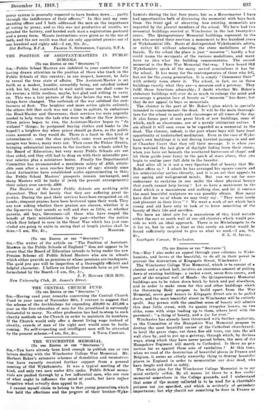THE POSITION OF ASSISTANT-MASTERS IN PUBLIC SCHOOLS.
(To THE Eritrea OF THE " Siscuroa."1 Sie,—Pnblic School Masters are indebted to your contributor for having drawn attention to the position of those who teach in the Public Schools of this country; in one respect, however, he fails to reveal the true state of affairs. The Assistant-Master is set forth as a modest, humble, unworldly being, not satisfied indeed with his lot, but contented to wait until some one shall come to his rescue; a little restless, maybe, but glad wad willing to carry on. This was a fair picture of the days before the war, but now things have changed. The outbreak of the war subdued the rest- lessness at first. The brighter and more active spirits enlisted; the others felt that such was not a time to agitate, to embarrass the Head-Master and Governors; their services too were urgently needed to help train the lads who were to officer the New Armies. When prices began to rise, the Assistant-Master began to "do without" things; he postponed buying clothes and books to the hoped!) a brighter day when prices should go down, as the politi- cians assured us they would do. There is a limit to this kind of retrenchment; soon the shoe pinched; some were assisted by a meagre war bonus, many were not. Then came the Fisher Grants. bringing substantial increases to the teachers in schools aided by the Board of Education; but very many Public Schools are not thus aided, and they still had to drag on with their miserable pre- war salaries plus a miniature bonus. Finally the Departmental Committee has recommended a maximum salary of 4450, attain- able soon after a man reaches forty years of age; already some Local Authorities have established scales approximating to this; the Public School Masters' prospects remain unchanged, and many Masters will be lucky if (with the present arrangements) their salary ever exceeds £300.
The Masters of the lesser Public Schools are seething with discontent. They feel keenly that they are suffering great in- justice. During the past their services have been recognized on all hands; eloquent praises have been bestowed upon their work. They are now asking whether these praises are sincere, whether it is the lip-service that sounds so well and does so little, or whether parents, old boys, Governors—all those who have reaped the benefit of their ministrations in the past—whether the nation which they helped to save -in the Great War which has just con- cluded are going to unite in seeing that at length justice shall be






































 Previous page
Previous page